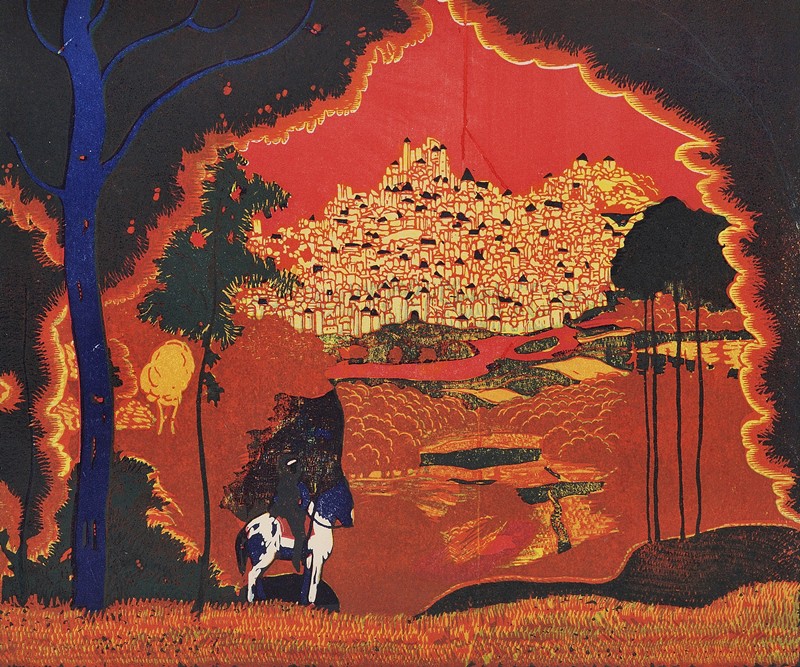Art by Josef Váchal
We live in a highly individualized world. Modern technologies and consumption habits have made every personality a type of costume to be tried on and discarded at will. People believe that their personal whims, indulgences and vain attempts at differentiation make them into stronger ‘individuals’. Often these identifiers just make us more obsessed with our own egos, especially when we haven’t cultivated the tools needed to be strong in our individualism (self-respect, discipline, honesty, etc). When we are obsessed with the ego, we neglect the true self and become pseudo-people. We continue piling on layers of external influence without looking within. All behaviors feel justified simply because they come from the ego. This is a dangerous path.
In prior eras of human existence, many peoples were concerned less with individuality and more with functioning properly within the structure of society. They had no choice if they wanted to survive. People used concepts of God, caste, monarchy and other larger than life ideals to justify their own individual submission to the system at large, trading personal freedom for the opportunity to live securely in a scary world. This is because society without advanced technology required more conformity just to survive, let alone flourish; its fruits (food, safety, well-being) were more scarce, and there was less room for error. This constraint, of course, had its own set of problems, namely constraining personal freedoms, preventing the respect of minorities and outliers, and enabling the violent tendencies of absolutism. We cannot retrieve the past, nor should we try. We can, however, use the past to figure out how to transcend our present shortcomings.
In our individualized present, the all-pervasive sensation of victimhood is often just as invented as the personalities we pick and choose to cultivate. When we acknowledge our personal individual perspective as the most important, we become solipsistic and cannot understand why the world does not conform to our wishes. What does this lead to? An odd paradox: people on every side of every spectrum who are so egotistical and self-involved that they feel unfree. Staunch individualism puts every individual at war with their own perceived opposite, which slows the efficient functioning of society while simultaneously stifling the individuals themselves. Instead of finding a healthy compromise, we dig ourselves deeper into the pit.
This is what I see happening right now in my own country, and it’s disheartening; each highly individualized individual views their opposite not as their complement in a naturally unbalanced world, but as their enemy and oppressor. I see this distancing happening between women and men, progressives and reactionaries, majorities and minorities. Everyone views one another as some sort of enemy. Instead of finding balance through difference and widening the spectrum of possibility, we just bicker and fight based on the most extreme inflammations. How do we approach spiritual practice without being so susceptible to these attachments to base ideals that cause such perpetual conflict?
We can start by understanding what it means to be grateful. Many spiritual people fall in the trap of traditionalism and fetishize the past, wishing to return to a simpler era. Instead, why can’t we look at the hardships of the past and acknowledge our transcendence of them? We should be grateful for the tools at our disposal, not resentful. Real mindfulness is treating every moment as equal, acknowledging what we’re grateful for while making the most of what we have. We can overcome our modern narcissism by not always thirsting for something more or something new. We already have so much complexity to learn how to deal with; we should slow down and figure out who we actually are.
I do believe we can meet our present and our past somewhere in the middle. I find values in Eastern philosophy that encourage this balance, since many Eastern traditions have been struggling with the relationship between the individual and the collective for many thousands more years than the West. I like to try to understand this struggle through theoretical mini-scenarios.
When I think about individualism and egoism, I think about candy. Candy is delicious, but if we just sit and eat it 24 hours a day, it makes us feel like trash. This is what pure individualism does to us over time. It quickly becomes a simplistic pleasure and novelty machine, encouraging more and more complexity and indulgence until one’s sense of self is truly screwed up. I think of collectivism as a sort-of ascetic fasting. When we choose to give ourselves up to society, we become boring monotonous drones. We do what we’re told and enable our own worst tendencies. We starve ourselves of freedom for so long that we wither and disappear into the crowd. We become highly sensitive and nonfunctional. Here we see a strong dualism that, using our Zen wisdom, we must transcend to find something more comprehensive and realistic.
Strong individualism and strong collectivism both rob us of our humanity. Individualism makes us a slave to the ego, which is never satisfied. Collectivism makes us a slave to the crowd, which is ignorant and base. This is the crux of why spirituality is so important for a well-functioning society. Meditation, gratitude, selfless service and love help us transcend all of the worst tendencies of natural human functioning, regardless of our affiliations or beliefs. Our problems arise when we believe that our thoughts are stronger than our actions. People will pretend to be ‘good’ but then treat one another with hatred and opposition. Spiritual practice helps us walk the walk as much as we talk the talk, no matter who we are on the surface.
Through meditation, we transcend the grasp of the ego while also embracing the true self. Through gratitude, we build joy, strength and discipline without constantly thirsting for change and novelty. Through selfless service, we give ourselves up to others and help those less fortunate than us in order to see the world through new eyes. Through love, we subvert the ego and let go of expectations so we can be present for another person. All of these behaviors, throughout history, are what make humans so special. They transcend the war of pure idealism. No amount of technology, leadership or wealth can change these core values for human understanding. The choice is always with each of us.
 Charlie Ambler is the creator of The Daily Zen and @dailyzen on Twitter. He began the site in 2008 as a way to chronicle his study of Zen and practice of meditation. He is currently working on raising enough funding to work on Daily Zen full-time and is also writing a book about Zen practice and contemporary life. Charlie live in Greenpoint, Brooklyn and enjoys playing drums, walking, and petting other peoples’ dogs. You can support his work by clicking here.
Charlie Ambler is the creator of The Daily Zen and @dailyzen on Twitter. He began the site in 2008 as a way to chronicle his study of Zen and practice of meditation. He is currently working on raising enough funding to work on Daily Zen full-time and is also writing a book about Zen practice and contemporary life. Charlie live in Greenpoint, Brooklyn and enjoys playing drums, walking, and petting other peoples’ dogs. You can support his work by clicking here.


